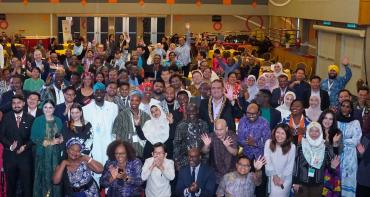Commonwealth Deputy Secretary-General calls for simple and focused youth constitution, which meaningfully engages young people, is inclusive, and has a robust communication strategy
Youth leaders are meeting in London, UK, to review a draft constitution that will reform the structure of youth governance in the Commonwealth.
Youth leaders from Africa, Asia, the Caribbean and the Pacific began three days of deliberations on 10 August 2011 on a working draft constitution for a new body called the Commonwealth Youth Council.
The youth council is proposed to replace the Pan-Commonwealth Youth Caucus (PCYC) as the prime youth governing body in the Commonwealth.
It will represent the interests of young people from member countries and dependent territories in the Commonwealth, and partner with the Commonwealth Secretariat on democratic and development issues.
Commonwealth Deputy Secretary-General Mmasekgoa Masire-Mwamba said youth leaders in the Commonwealth needed to agree a constitution that was simple and focused and could pave the way for all young people to participate in the Commonwealth.
“You must look for ways to improve inclusiveness, meaningful engagement and robust communication. If you can hit these three, then you can say you have a constitution that has the buy-in and the ownership of our young people,” Mrs Masire-Mwamba said.
The draft constitution will be discussed at the upcoming Commonwealth Youth Forum in Perth, Australia, in October this year. Invitations have been sent to member countries to nominate youth leaders from national youth councils/bodies to attend the meeting to further discuss the constitution.
Pan-Commonwealth Youth Caucus chair Noelyn Wagapu said fundamental change is needed because the current youth governance structure is not effective in addressing the issues and challenges Commonwealth youth face, and there is little recognition for the PCYC outside the Commonwealth, which has hindered its advocacy role on wider global socio-political and economic issues.
Opening the meeting at Marlborough House in London, Ms Wagapu said it is time to revise the Commonwealth’s youth governance structure to foster more meaningful youth engagement in the decision-making process of the Commonwealth.
“The consultations you do are important, you are the ones that will help bring change by listening to the thousands of youth voices, from national youth councils, national student bodies, and youth with disabilities. You are the ones that will help to channel their voices, ensuring that spaces are created where they will be heard and recognised in the Commonwealth,” she said.
Work started on the draft constitution in 2010 following the Commonwealth Youth Leaders Conference in India, where a sub-committee was set up to conduct regional consultations and work to compile a working draft document to be shared and discussed by Commonwealth young people.
Under the proposed reforms, the Commonwealth youth leaders will be elected from national youth councils/bodies through democratic elections. The new body will work to bring together the diversity of youth voices across the Commonwealth, especially the voices of marginalised youth.
Young people, who make up half of the Commonwealth’s population, will get to have their say in this process in a second round of consultations, which will begin on International Youth Day, 12 August 2011. Interested persons should visit http://www.yourcommonwealth.org/ and make their submissions to the Commonwealth.
The Deputy-Secretary General said once the constitution is complete, youth leaders will need to communicate its contents to the people of the Commonwealth.



